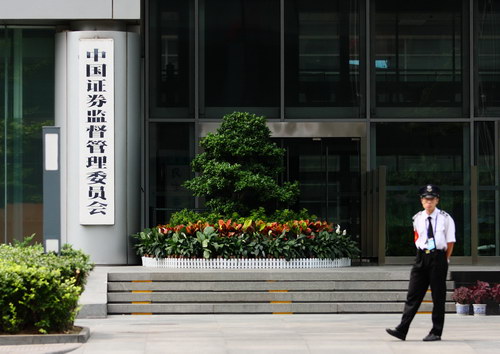Money
Chinese and US regulators meet to discuss accounting scandals
Updated: 2011-07-12 09:45
By Li Xiang and Karen Yip (China Daily)
BEIJING - Strengthened regulation by Chinese and US policymakers may reduce the number of Chinese companies listed in the United States, but it will boost investor confidence, said experts.
As accounting scandals at overseas-listed Chinese companies shake both investor confidence and the prospects of mainland firms aiming to list in the US, regulators from China and the US met on Monday to resolve the issue.
 |
|
A security guard in front of the China Securities Regulatory Commission. A US delegation is visiting Beijing to increase cooperation with the nation's regulator amid questions and waves of short selling involving domestic companies listed in the United States. [Photo/China Daily] |
Although there's little official information about the discussion, analysts believe the two sides will strengthen the supervision of Chinese companies to be listed on the US market.
Some Chinese companies have been accused of questionable accounting with relation to reverse takeovers, a backdoor listing method in which a foreign company merges with a US shell company.
The scandals have resulted in a slump in the share prices of many Chinese companies listed in the US and have dampened the prospects of domestic firms aiming to list in the world's most-advanced financial market.
"The strengthening of regulations (by China and the US) may lead to fewer Chinese companies going to the US, especially those through reverse takeovers," said Zhong Rixin, an analyst at the domestic financial portal imeigu.com. "But the improved supervision will help to ensure that only the really competitive companies can get listed. That will boost investor confidence in Chinese companies (in the future)."
Chinese companies should get used to stricter supervision from overseas regulators after the eruption of the scandals, said Christopher Low, president of the global risk management consultancy, Protiviti Greater China. They must abide by overseas information-disclosure requirements, which is the fundamental way to build up investor confidence.
Liu Qingsong, deputy director of the research center at the China Securities Regulatory Commission, told a conference in Singapore that Chinese regulators were considering how to improve regulation, but that overseas regulators also had to look at their own policies.
"I hate these scandals, everybody hates them. The scandals are very damaging to the reputation of all Chinese companies in the US," Liu was quoted as saying by Reuters.
"But when we look closely at all these companies we see most of them are not registered in China, most of them are registered outside the country."
Liu also said that the mainland regulators and their Hong Kong counterparts have had a good cooperative relationship, and the US regulators need to reflect on their own standards when cooperating with Chinese regulators.
Meanwhile, some of the Chinese companies whose stock prices have slumped may be the victims of short selling in the US market, analysts said.
"Personally, I find it troubling that so-called 'analysts' that are publicly disseminating these negative reports (of Chinese companies) are the very same analysts that are already shorting the stock, as they have a built-in economic motive and the opportunity to tarnish the reputation of these companies," said Perrie M. Weiner, partner and international co-chairman of securities litigation at the law firm DLA Piper LLP (US).

Specials

90th anniversary of the CPC
The Party has been leading the country and people to prosperity.

The write stuff
'Pen capital' goes back to drawing board for answers to economic changes taking shape in Zhejiang

Say hello to hi panda
An unusual panda is the rising star in Europe's fashion circles